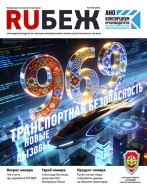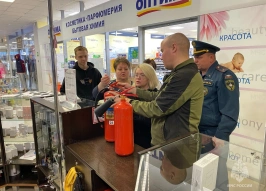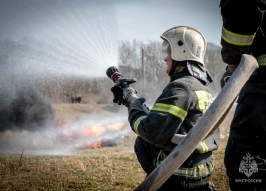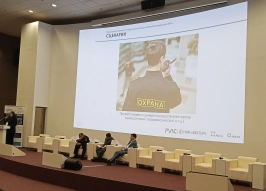Investor on the Doorstep
 Any program’s fate depends primarily on funding. The concept of hardware-software complex (HSC) "Safe City" is no exception. For example, for St. Petersburg alone, investment needed is estimated at more than 2 billion rubles. Although during a December meeting of the Ministry of Emergency Situations, Deputy Prime Minister Dmitry Rogozin called to consolidate the money needed for the implementation of such projects "in a single piggy bank", alternative financing schemes remain valid. RUBEZH magazine examined the existing participation experience of non-governmental and private investors in the projects devoted to the organization of security in Russian cities.
Any program’s fate depends primarily on funding. The concept of hardware-software complex (HSC) "Safe City" is no exception. For example, for St. Petersburg alone, investment needed is estimated at more than 2 billion rubles. Although during a December meeting of the Ministry of Emergency Situations, Deputy Prime Minister Dmitry Rogozin called to consolidate the money needed for the implementation of such projects "in a single piggy bank", alternative financing schemes remain valid. RUBEZH magazine examined the existing participation experience of non-governmental and private investors in the projects devoted to the organization of security in Russian cities.
Author: Maria Chimirichkina
RULES OF ENTRY
Regulatory framework for private investment in a variety of "Safe City" projects – is a model of public-private partnership (PPP) – and is provided by the 115-FZ "On Concession Agreements". The first competition in the form of PPP valued at 860 million rubles for the installation of a special hardware-software complex was established back in 2013 by the authorities of the Nizhny Novgorod region. In 2014, four tenders were conducted in search of investors in Saransk – for the installation of HSC "Safe City" under a PPP-contract with the sum of 550 million rubles. In Kostroma and Ryazan regions - for the concession agreement on the establishment and operation of an integrated road safety system for the term of 12 years. And finally, in August 2014, the Trans-Baikal region announced a concession agreement tender for the design, construction and operation of a video system of traffic situation control and traffic violations detection - in the amount not less than 500 million rubles. It is also known about an upcoming tender in the Volgograd region for the design, installation, renovation and operation of a photo and video system of traffic violations registration.
44-FZ (before 2014 - 94-FZ) – is another important document for attracting private investment in the framework of public procurement for HSC "Safe City". This law, however, does not allow commercial companies to invest directly in the infrastructure of city security, but contains a separate provision on service contracts, in particular on lifecycle contracts. For example, in the Omsk region, a similar project was implemented on the right to conclude a contract on the purchase of information distribution services for automated system of administrative offenses registration. The purchase of equipment at the same time became a part of the preparation stage for the subsequent provision of information distribution services.
In Dagestan, the right to enter into another contract – on provision of information concerning violations of traffic rules – was granted to Maykor Company, one of Russia's largest service providers. Under the terms of the state contract worth 700 million rubles, Maykor together with partner companies ("Compulink" and "Vita-Service") provides the purchase and installation of video surveillance systems, dispatching center equipment, and the creation of concurrent engineering infrastructure, as well as further coordination of the system - maintenance and distribution of recorded traffic violations reports. The contract was signed in late 2013 and suggests that Maykor will send at least 2 million of fines recovery notifications in the course of three years. It is from these funds the investor expects to recoup the investment in the project. "It was the first experience of such a project for the republic - says Anton Likhachev, Vice President of Maykor on Strategy and Business Development. - Therefore, we have received tasks not only prescribed in the state contract, but also additional ones. With our participation, the government and the Interior Ministry has successfully designed and fully equipped the Center of Automated Registration of Administrative Traffic Offences. We have invested our expertise, time and resources in this project, as well as in the pilot." The Pilot zone was launched in Makhachkala, and its presentation held in September 2013 was really an event of national importance. According to the results of the steps that have already been taken, the company has come to the conclusion that investment partnership based on service model is of greater interest than just participation in the creation of photo and video registration systems.
RISKS AND DEFEATED EXPECTATIONS
In the absence of a clear regulatory framework for successful investments into “Safe City” projects, business is forced to turn to the trial and error search method. A potential investor invests heavily in designing solutions, in the pilot deployment, and in the preparation of documentation, but at the same time has absolutely no assurance that the contract will be won.
For example, "Vita-Service" company together with their regional technology partner - "SibIT" - planned to become an investor for a project in the Trans-Baikal region. Development of solutions took more than two years. In close collaboration with the regional administration, the company worked on the formulation of technical specifications, criteria and conditions of the tender documentation. In mid-2014, this investment partnership has built a test zone for HSC "Safe City" for the international student festival in Chita and Vladivostok with its own resources. The system provided high-quality video surveillance, including automatic detection of threat algorithms. The implementation of the pilot required not only to design and purchase the equipment, but also to enter into service contracts by paying the certification of employees. However, after the publication of the competition, Siberian branch of "Rostelecom" showed considerable interest in the project, and "Vita-Service" miscalculated their chances when competing on price against costs incurred, and has withdrawn their intention to participate in this contest. As a result, the telecommunications operator became the only performer and gained the right to enter into a concession agreement.
Another risk for HSC “Safe City” investors lies in the problem of "recognition" of funds received by the budget as a result of security systems operation. Fines based on the results of video registration systems operation come, as a rule, to the regional budget, while the system is actually being built and supported by the city. The absence of regional budget allocation mechanism harms cities: Nizhny Tagil never received money from the regional treasury, and the municipality was left without resources to support the created video surveillance complex. "Payments for investment projects in the "Safe City" framework are formed by a particular percentage from the fines. These funds can only come to the regional budget, and all expenditures - maintenance, mailing of regulations, etc. – are carried out by investors - says Alexander Grigoriev, Director of Development at "Vita-Service". – Moreover, all the stages of this process are interrelated and one missed payment, for example, for postal services, can stop the whole process. Money received by the regional budget from fines, according to the 35th article of the Budget Code, are "not tagged" and the administration of the region that stays under constant budget deficit will always have a dilemma: to fulfill their obligations to a commercial partner or urgently repair a bursting pipeline."
Photo: © Depositphotos / SergeyNivens
CREATIVE APPROACH
The main reason to invest in "Safe City" projects today is represented by surveillance systems for roads and places of mass gathering of citizens (railway stations, airports, hospitals, schools, kindergartens, etc.). Subsystem of photo and video registration of traffic violations is so far the only one that is able to ensure the economic viability of private investment. However, experts agree: the potential for partnership in the field of social security is much wider. This is evidenced by the experience of the implementation of related programs that develop along with the "Safe City" concept and in the future could be integrated into a single complex of urban security systems as part of HSCs.
For example, as part of a pilot project, private investors provided resources for the installation of cameras in 20 preschool institutions. Access to the broadcast is granted via personal section of Moscow public services web portal. Now, the broadcast is free, but in the future the service will require payments. According to the voting results on the website "Active Citizen", people have expressed positive attitude towards the idea - the practice will be spread throughout the city. By spring 2015, the Department of Information Technology of Moscow plans to develop methodological and technical recommendations for the currently used technologies and algorithms of investors’ attraction.
Another example of business based on city security systems – is the installation of video surveillance equipment in house access areas on the principles of non-profit partnership. The "Safe House" program is being implemented by a non-profit association of the same name in already 11 cities of Russia. The program does not necessarily imply a direct profit, but each participant gets the benefit one way or another - from the loyalty of the population to preferences by the authorities. Thus, the assembly company "Cyfral-Service", which is the main project partner across the country, advertises its services free of charge, and recovers the investment thanks to an increase in sales for two or three years. Provider companies (in particular, "VimpelCom") provide data channels and data centers in exchange for access to camera feeds installed in house entrance areas. In turn, management companies can use the same cameras to monitor the work of their employees and contractors remotely.
The annual budget of the "Safe House" program, for example in Odintsovo, amounts to 12 million rubles. Program coordinator Vladislav Zhukovich says: "The launch is made possible if the authorities have the desire to assist, and business - to invest in reputation of a reliable and socially responsible supplier."
Another example. In Moscow region Ivanteevka, management company "School" together with builder companies, implements biometric fingerprint identification access control systems for house entrances. The cost of services can potentially be included in the price of housing in case of sale or in the list of paid utilities. In addition, the unique solution has attracted the attention of the Interior Ministry: the agency is considering the possibility of integrating the system with the police fingerprint database.
INVESTMENT AS A MARKET DRIVER
Considering all the expenditures, the experience of investors’ participation in projects for city and territory safety confirms the thesis about the benefits of competition. "In such arrangements, the performer is definitely more autonomous in the selection of equipment and partners, - says Anton Likhachev. - An investor is interested in installing quality software and hardware complexes, because economy cuts can lead to non-repayment of investment due to constant failures and breakdowns." The main advantage of an investment project is the fact that the price ceases to be the sole criterion for supplier choice, the focus shifts to other parameters: specifications of equipment, integration capabilities, vendor reliability, etc.
Andrew Yudnikov, CEO of Ivideon, confirms the benefits that come from the cooperation of authorities and commercial organizations. Ivideon provides surveillance in accordance with SaaS model): “Private companies - our partners – broadcast video from cameras installed in public places via the Internet. Their clients, may monitor building construction process, for example. I think this experience can be useful for Moscow authorities in the implementation of tasks related to "Safe City" projects.
The talks about the intention of Moscow authorities to oblige companies that own video surveillance systems installed in public areas, to provide access to video archives, have been running for a long time. "We believe this integration is quite interesting - continues Yudnikov. - But how can this be done in practice, is difficult to say. As long as the business sees no benefits, no one wants to participate in this integration. I think the project has a good future, but we still have to find a proper approach to its implementation."
THE PRICE IS NOT AN ISSUE
Experts disagree about the chances of private investors to obtain permanent residence in "Safe City" projects. "When it comes to public safety, no administration, and no ministry will have the desire to release a project from under their control. A private company may sell equipment or labor and get money for it, but it will not be allowed to go deep into the project "- says Alexander Snegirev, Chief Technology Officer at Vidau.
Sergei Minevich, Technical Director of trading house "Dean", disagrees with Snegirev: "If that happens, further development of private financing trend, will firstly lead to the emergence of relevant technologies in the “Safe City” HSC. Secondly, it will open the market to suppliers interested in open competition, and, finally, will bring certain benefits for consumers by identifying the best product in a competitive environment."
It is logical to assume that following the development of unified technical requirements, coordinators of HSC "Safe City" will start to attract funding for such projects. Moreover, this need is imposed by the overall economic context in which the concept will be implemented.
Источник: RUБЕЖ













